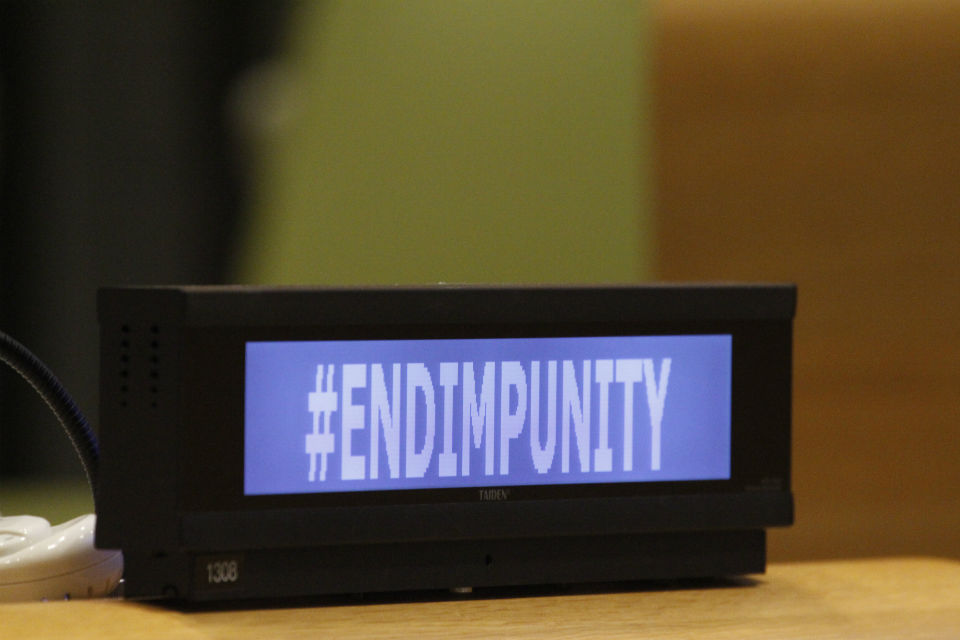"Justice for Daesh’s crimes not only empowers survivors, but can also unite communities and build a sustainable peace for all."
Statement by Ambassador Matthew Rycroft, UK Permanent Representative to the United Nations, at the High Level Event on Bringing Daesh to Justice.

At this event we are displaying the unity and diversity that Daesh seeks to destroy. We’re going to hear from a survivor, an advocate, and government and UN representatives; from men and women from different walks of life, from different faiths, all speaking out against Daesh’s doctrine of hate – and calling out for accountability for Daesh crimes.
And it’s a call, let’s face it, that needs to get louder. Only last week it was reported that, hundreds, if not thousands, of corpses had been found in a sink hole near Mosul, each and every one a victim of Daesh. And yet it wasn’t an isolated discovery. It’s been reported that over 70 mass graves have been found across Iraq and Syria, containing the remains of up to 15,000 men, women and children. Away from the mass graves, the stories of survivors, survivors like Nadia, who we are delighted to welcome here today, they tell of rape, of torture, of abductions and trafficking.
Such wanton killing, such senseless violence clearly could amount to war crimes, crimes against humanity, and in the case of the systematic targeting of minorities, even genocide. And yet, those responsible - to this day - remain free, unpunished and unabashed.
Six months on from the launch of this campaign by British Foreign Secretary Boris Johnson, and his Iraqi and Belgian counterparts, we’re here today to take stock on our efforts so far to end that impunity.
Since September, as part of this campaign the United Kingdom has been working closely with the Government of Iraq on a proposal to establish an investigative mechanism for Daesh’s crimes in Iraq through the Security Council.
Any international effort against Daesh should work alongside, and in support of, national efforts. Just as Iraqi forces fighting Daesh can count on our support to help win the war, so we offer our support to the Government of Iraq so that they can win the peace. Because justice for Daesh’s crimes not only empowers survivors, but can also unite communities and build a sustainable peace for all.
That’s why the United Kingdom sees the Government of Iraq as a key partner in this campaign and I’m glad that you Mohamed could join us today. We’re committed to working with you to take this campaign forward in a way that enhances, and supports, Iraq’s efforts to ensure accountability.
And we will continue to work with you on this proposal for the UN to assist you with the difficult but crucial challenge of preserving the huge amount of evidence of Daesh crimes committed on Iraqi territory. This is not a straightforward task. The proposal should support Iraq’s national efforts and fully respect it national laws and sovereignty. But it is also an urgent task. And we look forward to finalising that proposal with you very, very soon.
Preserving evidence in Syria is equally vital. The UK has funded NGOs who have collected evidence in Syria; evidence that we hope will soon be transferred to the International, Impartial and Independent Mechanism the General Assembly recently established to investigate international crimes in Syria - including those committed by Daesh.
Because as the horrific hospital attack in Kabul yesterday reminds us, this campaign to bring Daesh to justice isn’t just about Iraq. Or the Middle East. It’s a global challenge. Daesh doesn’t see nationalities, it doesn’t see borders. It just sees targets. Our pursuit of justice must be on behalf of all Daesh’s victims.
So we need to work together, gathering the evidence, securing the convictions for victims and survivors all over the world, from South Asia to Europe, from America to the Middle East. And, crucially, we must work together for the group that constitutes the vast majority of Daesh’s victims - Sunni Muslims. We cannot allow Daesh’s efforts to sow sectarian division.
As we reflect on progress made today, we should recognise the convictions achieved so far in Europe, the US, the Middle East and around the world. Most have been under a counter-terrorism framework and for acts such as membership of the organisation, financing, or travelling to join Daesh. But they are simply not enough.
In contrast, there have been very few prosecutions of Daesh for international crimes: namely war crimes, crimes against humanity, genocide. These are very same crimes that were prosecuted at Nuremberg, the very same committed in Rwanda, Sierra Leone, the former Yugoslavia. These are crimes that offend the very conscience of humanity.
And so we all need to do our bit. Just as Daesh terrorises people all over the world, so it fills its ranks with citizens of all our countries. These foreign terrorist fighters are a shared problem and a shared responsibility. We must utilise all the tools at our disposal to source the vital evidence needed to build cases against those who choose to fight for Daesh.
The testimony of survivors is a crucial part of that effort. And I’d like to pay tribute again to you Nadia for your bravery in sharing your story with the world. And make no mistake, it’s voices like Nadia’s which one day will be heard in court thanks to people like you, Amal.
We must do all do what we can to support that effort, both at home and in the United Nations. Six months on, it’s clear that there is still so much more to do, but I’m confident that together we can make accountability a reality.
Thank you.